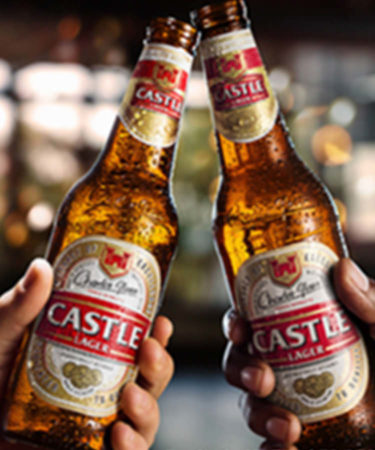Anheuser-Busch InBev gets lots of attention for its business practices stateside. Buying up formerly independent breweries, say, or taking over tap handles and shelf space.
But let’s not forget, this company is global. This week, AB InBev set its sights on Africa.
According to Reuters, AB InBev has hatched a plan to “lure price-conscious South Africans to its mid-market beers and away from bargain rivals or homebrews,” by pushing the South African brands it acquired in its 2016 purchase of SABMiller, namely Carling Black Label, South Africa’s most popular beer, and Castle, another macro lager.
How will it be doing this? Discounts, of course.
AB InBev’s promotions in areas like Johannesburg have been ramping up big time. One Johannesburg tavern is selling 1-liter bottles of Black Label for 19 rand, or about $1.50. “This is all I drink now,” one patron told Reuters.
At another promotion at a liquor store in Sasolburg, Castle beer was on sale in 18-packs beside a sign reading, “Buy 12 and get 6 extra free.” One shopper said, “It’s a steal.”
As African consumers slurp up promotions for beers like Castle and Carling, AB InBev will be going to work on its premium lager brands, such as Budweiser, Stella Artois, and Corona, in hopes of gaining market share.
Meanwhile, South African beer drinkers’ attention and dollars will be diverted from the local independent brewers in and around Johannesburg. These include Optimum Craft Brewery in Randburg, a family establishment that got its start with a homebrew kit; Inmind Brewing of Kya Sand, helmed by a father-and-son duo; and Oakes Brew House in Modderfontein, the only South African brewery run entirely by women.
“Clearly there’s room for making our products more present. That’s definitely a big part of our efforts here,” Ricardo Tadeu, who oversees African distribution for AB InBev, said. “In comparison to where we have been, these markets are still being developed.”
AB InBev is bigger — way bigger — than Budweiser and the handful of craft breweries it’s snatched up in the States. While we’re worrying about AB InBev’s High End or whining about whether or not Goose Island is still a craft brewery, AB InBev is strategizing on how to get low-wage workers in mining towns to buy more of its cheap beer — to eventually make room for more Budweiser.
Sometimes it’s good to step back and put things in perspective. The beer industry, and AB InBev’s control over it, goes far beyond the U.S.
Shmaltz Brewing Goes Gypsy, SingleCut Beersmiths Expands North
After recently expanding its brand portfolio and distribution network, and doubling its sales force, Shmaltz Brewing of Clifton Park, N.Y. announced it has sold its brewery to SingleCut Beersmiths of Queens. Shmaltz, which launched in 1996, has been brewing its and others’ beer brands in Clifton Park since 2013. The brewery equipment and facility will change hands from Shmaltz owner Jeremy Cohen to Singlecut owner Rich Buceta.
Shmaltz will retain full ownership of its brands and, during the transition to SingleCut over the next several months, will continue brewing and operating in its tasting room. It will, however, announce new brewing partners soon.
Shmaltz’s sale to SingleCut is somewhat surprising, considering the growth it’s shown in recent months. In February, Shmaltz announced the launch of a new contract brand, Alphabet City Brewing. In April, Shmaltz announced a new partnership with Artisanal Imports, expanding its distribution into new markets in more than 30 states.
On the other hand, it’s a sign of the times. Being nimble is necessity to keep beer brands alive, even if that means selling your brewery and making your beer at someone else’s.
And money talks. SingleCut is the only brewery in New York City that owns its building (and now, two!). It’s one of the only New York brewers that exports its brands to other countries. In short, it’s grown immensely in the less than 10 years it’s been open.
It’s hard to say what will happen to Shmaltz or SingleCut with this transition. I don’t see myself drinking any more or less of either, really. But that’s probably irrelevant; neither of these brewers needs my support. Both of them are probably millionaires, and they’ll keep making beer — and deals — whether I like it or not.
